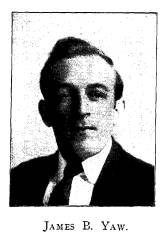Ohio History Journal
|
224 Ohio Arch. and Hist. Society Publications.
speaker's stand were also seated Judge M. H. Donahue of the Ohio Supreme court, and Hon. Randolph W. Walton and Mrs. Paul MacGahan. The veil which consisted of a Bulgarian and American flag was presented to Dr. Bozovosky and Paul Mac- Gahan. The detachment of O. N. G. formed a guard of honor about the grave and the famous Seventh regiment band dis- coursed several appropriate selections.
REMARKS OF JAMES B. YAW. J. A. MacGahan, a son of Perry County, lies buried here. We have set apart this time to speak of him and to unveil a monument erected to his memory. This day, July 4th, and the event we have met here to cele- brate, are appropriately and happily joined together. The one, |
|
|
|
to honor the memory of one who immolated his strength, his ability, his genius for others. One, who in the short span of years given him brought smiles to the faces of thousands where before there had been only tears and long drawn lines of suffer- ing. We meet here, also, as fellow country-men of MacGahan and in that capacity, we unveil the stone that stands at his grave. I say this because the monument erected here is only of |
The MacGahan Monument. 225
local significance. It can not honor
MacGahan in Europe or
American. It can not honor him anywhere
nor in the memory
of any person. The stone can do this,
and this only: that when
his countrymen or strangers pass this
way, they will be reminded
that this is sacred ground, that one
greater than a king lies
here, that to this spot, is due more
deference than to a king's
mausoleum.
I have often thought of the career of
MacGahan. It is a
wonderful story. From the log cabin in
the backwoods of our
county to the Liberator of a people, is
a long road. At an
early age, poverty forced him to leave
home. You can see him
struggling, alone and unaided. At last,
his worth not to be
hidden by adverse conditions, aroused
the interest of a great
journalist. Then it was that his great
heart began to come into
its own. With keen perceptions and
undaunted courage he
wrote.
Whether he was suffering the hardship of
the polar regions
in order to paint the words, the glories
of nature, or in Paris,
during the Commune where the terrors of
a guillotine sentence
were laid upon him it was always that
same devotion to truth
and principle that lead him on.
It was to the people of the war-swept
Balkan region that
MacGahan rendered his greatest service
and made his final sac-
rifice. To these down-trodden simple
people his heart went out
and in his letters to London, he put his
whole soul. They seemed
to be written in blood and stained with
the tears of the people
whose wrongs he pictured. Although not a
citizen of Europe,
without money or position, yet MacGahan
forced the Nations
of The Old World to heed the cry of
humanity.
It is somewhat strange that our country,
one of the young-
est of the family of nations; that one
of the youngest states
of this country, and even yet one of the
youngest counties of
that state, should send a man, not west,
nor north, nor south, but
back over the path of progress to light
the torch of liberty
where civilization had failed to nourish
that sacred flame.
Vol. XXI- 15.
